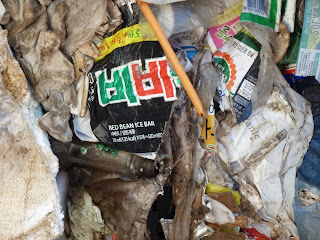Toxics Watchdog Urges Manila LGU to Take Action against Street Sale of Poisonous Substances
Pictures taken on June 26, 2015 in Divisoria, Manila.
The EcoWaste Coalition, a toxics watchdog group, appealed to Manila city authorities to take action against the unimpeded sale of poisonous substances on the streets, particularly in Divisoria.
The group aired its latest plea for action as the
observance of the National Poison Prevention Week (NPPW) comes to an end.
NPPW, held every fourth week of June by virtue of
Presidential Proclamation 1777 issued in 2009, is observed “to increase
awareness on the preventive aspects of poisoning prevention at home, school,
work and the general environment”
The group expressed serious concern over the sale of
repacked chlorine and oxalic acid in granular form from P20 up by street
vendors in Ilaya, Santa Elena and Tabora Streets.
“Based on the market surveillance we conducted
yesterday, vendors have yet to stop
selling repacked chlorine and oxalic acid in Divisoria,” stated Thony Dizon,
Coordinator of the EcoWaste Coalition’s Project Protect.
“As a preventive measure, we urge the Manila City
Government to put a stop to this dangerous street trade of poisonous substances
in unlabeled packets and not wait for more poisoning cases to occur,” he said.
“Aside from being sold without proper labeling
information and precautionary warning, these repacked poisons are being sold
alongside condiments thus increasing the risks of cross-contamination,” he
added.
Oxalic acid has been blamed for the Ergo Cha Milk Tea
House poisoning incident in Sampaloc, Manila on April 9 that killed the shop
owner and one customer, prompting Manila Health Department operatives to seize
sacks of repacked oxalic acid from Divisoria street vendors last month.
More recently, 41 public elementary school students in
Cauayan, Negros Occidental were rushed to hospitals on June 10 after eating
“bichokoy” (a local donut) sprinkled with white sugar mixed with oxalic acid.
Chlorine granules in water, on the other hand, ranked
number nine in 2014 among the top 10 poison agents for admitted patients at
the Philippine General Hospital, both for adult and pediatric cases, according
to the National Poison Management and Control Center.
Used as bleaching or cleaning agent, oxalic acid and
chlorine granules look like iodized salt or refined sugar, and form a colorless
liquid when mixed with water.
-end-








Comments